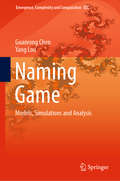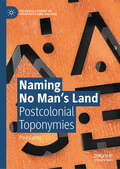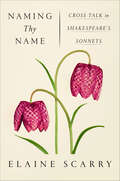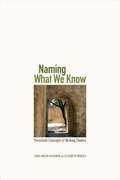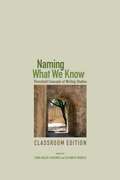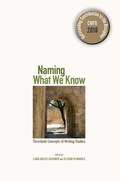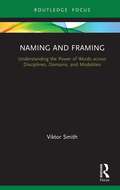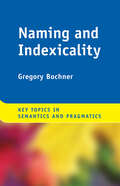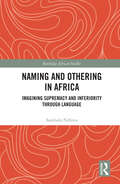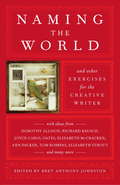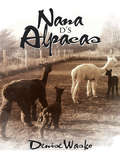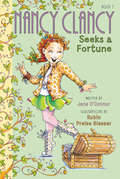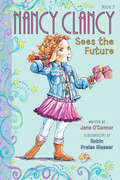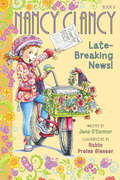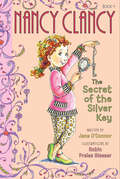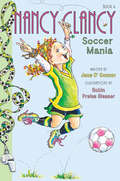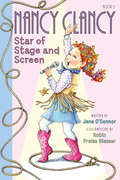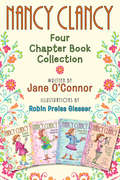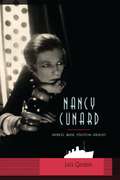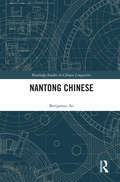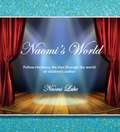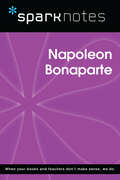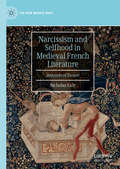- Table View
- List View
Names, Proverbs, Riddles, and Material Text in Robert Frost
by Timothy D. O’brienThis study examines several unexplored aspects of the poetry of Robert Frost, one of the most widely read and studied American poets, and shows how they contribute to the reader's experience and modernism in general.
Naming Game: Models, Simulations and Analysis (Emergence, Complexity and Computation #34)
by Guanrong Chen Yang LouThis book provides a gradual introduction to the naming game, starting from the minimal naming game, where the agents have infinite memories (Chapter 2), before moving on to various new and advanced settings: the naming game with agents possessing finite-sized memories (Chapter 3); the naming game with group discussions (Chapter 4); the naming game with learning errors in communications (Chapter 5) ; the naming game on multi-community networks (Chapter 6) ; the naming game with multiple words or sentences (Chapter 7) ; and the naming game with multiple languages (Chapter 8). Presenting the authors’ own research findings and developments, the book provides a solid foundation for future advances. This self-study resource is intended for researchers, practitioners, graduate and undergraduate students in the fields of computer science, network science, linguistics, data engineering, statistical physics, social science and applied mathematics.
Naming No Man’s Land: Postcolonial Toponymies (Palgrave Studies in Creativity and Culture)
by Paul CarterThis book is a practice-based exploration of the politics and poetics of replacing colonial placenames with Indigenous ones. From a horizon of case-studies in Western Australia, the study develops a lively dialogue with international critical toponymy theory and with older etymological approaches to place renaming and legitimation. The author shows how renaming raises fundamental questions of meaning, reference and cross-cultural equivalence. Recognising the ‘sense of place’ values that accrue to placenames, Carter argues that placenames have a creative as well as discursive function: they are talking points that bring places into being. For this reason, to decolonize toponymy involves a postcolonial poetics. Naming No Man’s Land argues for a practical, community-shaped toponymic poetics that escapes from the binarist logic of imposition/erasure, showing that, when the principle that ‘places are made after their stories’ is followed, new creative mechanisms of co-existence can emerge. A must read for anyone engaged in postcolonial studies, creativity studies, cultural geography, sociolinguistics, historical ethnography, eco-criticism, environmental humanities, (Australian) Aboriginal studies, and related disciplines.
Naming Thy Name: Cross Talk in Shakespeare's Sonnets
by Elaine ScarryA fascinating case for the identity of Shakespeare’s beautiful young manSHAKESPEARE’S SONNETS ARE indisputably the most enigmatic and enduring love poems written in English. They also may be the most often argued-over sequence of love poems in any language. But what is it that continues to elude us? While it is in part the spellbinding incantations, the hide-and-seek of sound and meaning, it is also the mystery of the noble youth to whom Shakespeare makes a promise—the promise that the youth will survive in the breath and speech and minds of all those who read these sonnets. “How can such promises be fulfilled if no name is actually given?” Elaine Scarry asks. This book is the answer. Naming Thy Name lays bare William Shakespeare’s devotion to a beloved whom he not only names but names repeatedly in the microtexture of the sonnets, in their architecture, and in their deep fabric, immortalizing a love affair. By naming his name, Scarry enables us to hear clearly, for the very first time, a lover’s call and the beloved’s response. Here, over the course of many poems, are two poets in conversation, in love, speaking and listening, writing and writing back. In a true work of alchemy, Scarry, one of America’s most innovative and passionate thinkers, brilliantly synthesizes textual analysis, literary criticism, and historiography in pursuit of the haunting call and recall of Shakespeare’s verse and that of his (now at last named) beloved friend.
Naming What We Know
by Linda Adler-KassnerNaming What We Know examines the core principles of knowledge in the discipline of writing studies using the lens of "threshold concepts"--concepts that are critical for epistemological participation in a discipline. The first part of the book defines and describes thirty-seven threshold concepts of the discipline in entries written by some of the field's most active researchers and teachers, all of whom participated in a collaborative wiki discussion guided by the editors. These entries are clear and accessible, written for an audience of writing scholars, students, and colleagues in other disciplines and policy makers outside the academy. Contributors describe the conceptual background of the field and the principles that run throughout practice, whether in research, teaching, assessment, or public work around writing. Chapters in the second part of the book describe the benefits and challenges of using threshold concepts in specific sites--first-year writing programs, WAC/WID programs, writing centers, writing majors--and for professional development to present this framework in action.Naming What We Know opens a dialogue about the concepts that writing scholars and teachers agree are critical and about why those concepts should and do matter to people outside the field.
Naming What We Know, Classroom Edition: Threshold Concepts of Writing Studies
by edited by Linda Adler-Kassner, Elizabeth WardleNaming What We Know, Classroom Edition examines the core principles of knowledge in the discipline of writing studies, using the lens of “threshold concepts”—concepts that are critical for epistemological participation in a discipline. This edition focuses on the working definitions of thirty-seven threshold concepts that run throughout the research, teaching, assessment, and public work in writing studies. Developed from the highly regarded original edition in response to grassroots demand from teachers in writing programs around the United States and written by some of the field’s most active researchers and teachers, the classroom edition is clear and accessible for an audience of even first-year writing students.
Naming What We Know: Threshold Concepts of Writing Studies
by Elizabeth Wardle Linda Adler-KassnerNaming What We Know examines the core principles of knowledge in the discipline of writing studies using the lens of “threshold concepts”—concepts that are critical for epistemological participation in a discipline. The first part of the book defines and describes thirty-seven threshold concepts of the discipline in entries written by some of the field’s most active researchers and teachers, all of whom participated in a collaborative wiki discussion guided by the editors. These entries are clear and accessible, written for an audience of writing scholars, students, and colleagues in other disciplines and policy makers outside the academy. Contributors describe the conceptual background of the field and the principles that run throughout practice, whether in research, teaching, assessment, or public work around writing. Chapters in the second part of the book describe the benefits and challenges of using threshold concepts in specific sites—first-year writing programs, WAC/WID programs, writing centers, writing majors—and for professional development to present this framework in action. Naming What We Know opens a dialogue about the concepts that writing scholars and teachers agree are critical and about why those concepts should and do matter to people outside the field.
Naming and Framing: Understanding the Power of Words across Disciplines, Domains, and Modalities (Routledge Studies in Multimodality)
by Viktor SmithThis book offers an innovative, unified theoretical model for better understanding the processes underpinning naming and framing and the power that words exert over human minds. The volume integrates theoretical paradigms and empirical insights from across a broad array of research disciplines, several of which have not been combined before, and uses this foundation as a point of departure for introducing its four-layered model of distinct but connected levels of analysis. Bringing together insights from cognitive linguistics and psycholinguistics together with multimodal perspectives, Smith establishes new cross-disciplinary links, further integrating work from neighbouring fields such as marketing, health communication, and political communication, that indicate paths for future research and implications for communicative ethics. This book will be of particular interest to students and scholars in multimodality, communication, semiotics, cognitive psychology, and linguistics, as well as those in related disciplines such as marketing, political communication, and health communication.
Naming and Indexicality (Key Topics in Semantics and Pragmatics)
by Gregory BochnerHow do words stand for things? Taking ideas from philosophical semantics and pragmatics, this book offers a unique, detailed, and critical survey of central debates concerning linguistic reference in the twentieth century. It then uses the survey to identify and argue for a novel version of current 'two-dimensional' theories of meaning, which generalise the context-dependency of indexical expressions. The survey highlights the history of tensions between semantic and epistemic constraints on plausible theories of word meaning, from analytic philosophy and modern truth-conditional semantics, to the Referentialist and Externalist revolutions in theories of meaning, to the more recent reconciliatory ambition of two-dimensionalists. It clearly introduces technical semantical notions, theses, and arguments, with easy-to-follow, step-by-step guides. Wide-ranging in its scope, yet offering an accessible route into literature that can seem complex and technical, this will be essential reading for advanced students, and academic researchers in semantics, pragmatics, and philosophy of language.
Naming and Othering in Africa: Imagining Supremacy and Inferiority through Language (Routledge African Studies)
by Sambulo NdlovuThis book examines how names in Africa have been fashioned to create dominance and subjugation, inclusion and exclusion, others and self. Drawing on global and African examples, but with particular reference to Zimbabwe, the author demonstrates how names are used as weapons by in-groups and out-groups in class, race, ethnic, national, gender, sexuality, religious and business struggles in society. Using Othering theory as a framework, the chapters explore themes such as globalised names and their demonstration of the other, onomastic erasure in colonial naming and the subsequent decoloniality in African name changes, othering of women in onomastics and crude and sophisticated phaulisms in the areas of race, ethnicity, nationality, disability, sexuality. Highlighting social power dynamics through onomastics, this book will be of interest to researchers of onomastics, social anthropology, sociolinguistics and African culture and history.
Naming the World: And Other Exercises for the Creative Writer
by Bret Anthony JohnstonYou already have the tools to become a gifted writer; what you need is the spark. Harvard creative writing professor and acclaimed author Bret Anthony Johnston brings you an irresistible interactive guide to the craft of narrative writing. From developing characters to building conflict, from mastering dialogue to setting the scene, Naming the World jump-starts your creativity with inspiring exercises that will have you scrambling for pen and paper. Every chapter is a master class with the country's most eminent authors, renowned editors, and dedicated teachers. * Infuse emotion into your fiction with three key strategies from Margot Livesey. * Christopher Castellani dumps the "write what you know" maxim and challenges you to really delve into the imagination. * A point-of-view drill from Susan Straight can be just the breakthrough you need to flesh out your story. * Jewell Parker Rhodes shares how good dialogue is not just about what is being said but about what is being left unsaid. Brimming with imaginative springboards and hands-on exercises, Naming the World has everything you need to become a stronger, more inventive writer. "A delicious book. Imagine yourself at a cocktail party crammed with literary lions. You have the chance to spend a few moments with each of them. Wit and wisdom abound." -Julia Cameron, author of The Artist's Way. "A highly useful and perceptive book. With charm and intelligence it touches on nearly every teachable aspect of the devilishly difficult art of writing." -Ethan Canin, professor of creative writing at the Iowa Writers Workshop, and author of Carry Me Across the Water. "These entertaining and useful exercises, intelligently organized, are a boon for both beginning and experienced writers." -Andrea Barrett, National Book Award--winning author of The Air We Breathe. "Forget about getting an MFA! For any writer struggling with his craft, here is the equivalent of a master class in writing by some of the best writer/teachers around." -Betsy Lerner, author of The Forest for the Trees: An Editor's Advice to Writers.
Nana D's Alpacas
by Denise WaskoMs. Emily and her preschool classroom take an adventurous trip to learn more about alpacas. Come along on the journey to discover how curiosity and investigation lead to a love of outdoor learning.
Nancy Clancy Seeks a Fortune (I Can Read! #7)
by Jane O'Connor Robin Preiss Glasser Carolyn BrackenNancy Clancy learns all about starting a business and making a fortune in the seventh chapter book in the Nancy Clancy chapter book series by New York Times bestselling team Jane O'Connor and Robin Preiss Glasser! <P><P>How great would it be to be wealthy--that's elegant for rich. Nancy Clancy sure thinks so, and with the help of her best friend, Bree, she sets out to make a fortune one way or another. <P>But when things don't go as planned, Nancy learns something even more valuable--some of the best things in life are free.
Nancy Clancy Sees the Future (I Can Read! #3)
by Jane O'ConnorNancy Clancy is back in New York Times bestselling team Jane O'Connor and Robin Preiss Glasser's third Fancy Nancy chapter book, Nancy Clancy Sees the Future! Nancy thinks she may be able to read the future . . . and all signs point to her being a true clairvoyant--that's fancy for fortune-teller. <P><P>In this perfect follow-up to Nancy Clancy, Super Sleuth and Nancy Clancy, Secret Admirer, Nancy tries her hand at fortune-telling but quickly learns it's a bit more complicated than she thought. Does Nancy really have special powers, or is it all just a coincidence? <P>Fancy Nancy fans will love joining Nancy Clancy in the latest edition to the chapter book series. The central theme of all the Nancy Clancy books shines through, showing the power of positive thinking.
Nancy Clancy, Late-Breaking News! (I Can Read! #8)
by Jane O'Connor Robin Preiss GlasserFrom New York Times bestselling team Jane O’Connor and Robin Preiss Glasser comes the eighth and final installment of the Fancy Nancy chapter book series: Nancy Clancy and the Late-Breaking News! <P><P>Nancy Clancy is working to be the star reporter of the Third Grade Gazette—that’s a fancy word for newspaper. <P>When the latest issue comes out, Nancy and Bree decide the articles just aren’t interesting enough and set out to find some really exciting news to report on. <P> But when Nancy overhears something she shouldn’t and the news gets out, she learns that a good reporter knows when to keep things confidential and may even get some surprising and unexpected news herself.
Nancy Clancy, Secret of the Silver Key (I Can Read! #4)
by Jane O'Connor Robin Preiss Glasser<P>Join Nancy Clancy in New York Times bestselling team Jane O'Connor and Robin Preiss Glasser's fourth Nancy Clancy chapter book about the past, present, and future! Nancy and her best friend, Bree, must go back in time to solve their latest mystery. <P>While Nancy's class learns about time capsules in school, another relic from the past pops up in the present. Nancy buys an old desk at a tag sale and soon finds out that someone left behind a key. In the perfect follow-up to Nancy Clancy, Super Sleuth; Nancy Clancy, Secret Admirer; and Nancy Clancy Sees the Future, Nancy and Bree set out to unlock the secret of the silver key in the hopes of finding some treasure along the way. <P>But unlocking the mystery soon proves to be more difficult than they had thought, and when the answer isn't what they had expected, Nancy and Bree learn there are some things that remain timeless forever. Fans of Fancy Nancy will love joining Nancy Clancy in the latest edition to the chapter book series. The central theme of all the Nancy Clancy books shines through, showing the power of positive thinking and the will to never give up.
Nancy Clancy, Soccer Mania (I Can Read! #6)
by Jane O'Connor Robin Preiss GlasserNancy Clancy takes the field in New York Times bestselling team Jane O'Connor and Robin Preiss Glasser's sixth Nancy Clancy chapter book. <P><P>Normally Nancy doesn't like dressing like everyone else. But wearing a soccer team uniform--well, that's different. Nancy adores being on the Green Goblins--she loves cheering for her teammates, sharing refreshments, and painting her fingernails bright green before every game. <P>If only she wasn't cursed with slow legs! All Nancy wants is to be mediocre--or maybe even a little better than average. Will she reach her goal? <P> Here's a brand-new chapter book with plenty of humor and sports action, written expressly for kids like Nancy who aren't the star of their team. Fans of Fancy Nancy will love joining Nancy Clancy in the latest edition to the chapter book series!
Nancy Clancy, Star of Stage and Screen (I Can Read! #5)
by Jane O'Connor Robin Preiss GlasserNancy Clancy is ready for her close-up in the fifth chapter book in the Nancy Clancy chapter book series by the New York Times bestselling team of Jane O'Connor and Robin Preiss Glasser.It's <P><P>Nancy's time to shine as she takes center stage in the school play! There's no way Nancy will get stuck in the chorus again this year--she's been practicing guitar for months and her audition was superb. So when Nancy gets a callback, she's overwhelmed with joy! <P>But after Nancy's performance during the play is captured on a video that gets posted on YouTube, it seems her stardom has gone viral. Will Nancy's humiliation get the best of her, or will she find a way to embrace her newfound fame? <P>Fans of Nancy Clancy will enjoy watching Nancy sparkle in the spotlight in her latest chapter book. The central theme of all the Nancy Clancy books shines through, showing the power of positive thinking.
Nancy Clancy: Four Chapter Book Collection
by Jane O'Connor Robin Preiss GlasserSassy Fancy Nancy is now a detective! Kids who grew up with Jane O'Connor's Fancy Nancy picture books can spend some quality time with their BFF because Nancy Clancy is now starring in her own chapter books! This collection includes the first four Nancy Clancy mysteries.Nancy Clancy, Super Sleuth: When one of Nancy's classmate's most special possessions disappears from school, it's up to her to save the day. With the help of her friend Bree, she follows the clues to an unexpected source.Nancy Clancy, Secret Admirer: Nancy and Bree decide to play matchmaker, but nothing works out as planned. Will love conquer all in the end?Nancy Clancy Sees the Future: Nancy thinks she may be able to read the future . . . and all signs point to her being a true clairvoyant (that's fancy for a fortune-teller). Does Nancy really have special powers, or is it all just a coincidence?Nancy Clancy, the Secret of the Silver Key: Nancy buys an old desk at a tag sale and soon finds out that someone left behind a key. Nancy and Bree set out to unlock the secret of the silver key in the hopes of finding some treasure along the way. But unlocking the mystery soon proves to be more difficult than they had thought, and when the answer isn't what they had expected, Nancy and Bree learn there are some things that remain timeless forever.
Nancy Cunard: Heiress, Muse, Political Idealist
by Lois GordonLois Gordon's absorbing biography tells the story of a writer, activist, and cultural icon who embodied the dazzling energy and tumultuous spirit of her age, and whom William Carlos Williams once called "one of the major phenomena of history."Nancy Cunard (1896-1965) led a life that surpasses Hollywood fantasy. The only child of an English baronet (and heir to the Cunard shipping fortune) and an American beauty, Cunard abandoned the world of a celebrated socialite and Jazz Age icon to pursue a lifelong battle against social injustice as a wartime journalist, humanitarian aid worker, and civil rights champion.Cunard fought fascism on the battlefields of Spain and reported firsthand on the atrocities of the French concentration camps. Intelligent and beautiful, she romanced the great writers of her era, including three Nobel Prize winners, and was the inspiration for characters in the works of Ezra Pound, T. S. Eliot, Aldous Huxley, Pablo Neruda, Samuel Beckett, and Ernest Hemingway, among others. Cunard was also a prolific poet, publisher, and translator and, after falling in love with a black American jazz pianist, became deeply committed to fighting for black rights. She edited the controversial anthology Negro, the first comprehensive study of the achievement and plight of blacks around the world. Her contributors included Langston Hughes, W. E. B. Du Bois, and Zora Neale Hurston, among scores of others.Cunard's personal life was as complex as her public persona. Her involvement with the civil rights movement led her to be ridiculed and rejected by both family and friends. Throughout her life, she was plagued by insecurities and suffered a series of breakdowns, struggling with a sense of guilt over her promiscuous behavior and her ability to survive so much war and tragedy. Yet Cunard's writings also reveal an immense kindness and wit, as well as her renowned, often flamboyant defiance of prejudiced social conventions.Drawing on diaries, correspondence, historical accounts, and the remembrances of others, Lois Gordon revisits the major movements of the first half of the twentieth century through the life of a truly gifted and extraordinary woman. She also returns Nancy Cunard to her rightful place as a major figure in the historical, social, and artistic events of a critical era.
Nancy Hale: On the Life and Work of a Lost American Master (Unsung Masters Series)
by Dan Chaon Phong NguyenNancy Hale (1908-1988) began publishing short stories in The New Yorker in the 1930s, and her career spanned the next fifty years. Her novel The Prodigal Women was a runaway bestseller in 1942. Yet today Nancy Hale is nearly forgotten. This collection of seven short stories and numerous critical essays seeks to bring Hale's work to today's readers. Though she writes about an effete group of characters - wealthy, artistic women from New England or Virginia - Hale captures the joys and sadness of the human condition.
Nantong Chinese (Routledge Studies in Chinese Linguistics)
by Benjamin AoNantong Chinese is an in-depth account of an interesting and endangered Sinitic language spoken in Nantong, China, in an area in the Northern Yangtze River Delta about 800 square kilometers in size and 105 kilometers northwest of the city of Shanghai. The Chinese language consists of several hundred local varieties known as Sinitic languages or Chinese dialects, each representing a unique linguistic system. This book offers a comprehensive and systematic insight into one such system that is even more complex and more interesting than standard Mandarin. The unique vocalization and other linguistic features of Nantong Chinese make it unintelligible to most Chinese people. All the important linguistic aspects of Nantong Chinese are covered, including its phonetic, lexical, morphological and syntactic subsystems. Nantong Chinese will be of interest to professionals and students in linguistics worldwide.
Naomi's World: Follow Harmony the Hen through the world of children’s author Naomi Lake
by Naomi LakeThis book, brought to you by Carers WA, dives into the challenges young people may have with disabilities. No matter what you face in life or the challenges it brings you, stay strong and never give up on your dreams. Naomi is a children's author in Albany, Western Australia who has published two books about Harmony the Hen. She is also an ambassador for Down Syndrome WA. "Being a role model for others and encouraging children to read and write is a passion of mine because it has opened up the world for me. I love learning and trying new things whenever I have the opportunity. You just have to go out to explore the world because the world won’t come to you.”
Napoleon Bonaparte (SparkNotes Biography Guide)
by SparkNotesNapoleon Bonaparte (SparkNotes Biography Guide) Making the reading experience fun! SparkNotes Biography Guides examine the lives of historical luminaries, from Alexander the Great to Virginia Woolf. Each biography guide includes:An examination of the historical context in which the person lived A summary of the person&’s life and achievements A glossary of important terms, people, and events An in-depth look at the key epochs in the person&’s career Study questions and essay topics A review test Suggestions for further reading Whether you&’re a student of history or just a student cramming for a history exam, SparkNotes Biography guides are a reliable, thorough, and readable resource.
Narcissism and Selfhood in Medieval French Literature: Wounds of Desire (The New Middle Ages)
by Nicholas EalyThis book offers analyses of texts from medieval France influenced by Ovid’s myth of Narcissus including the Lay of Narcissus, Alain de Lille’s Plaint of Nature, René d’Anjou’s Love-Smitten Heart, Chrétien de Troyes’s Story of the Grail and Guillaume de Machaut’s Fountain of Love. Together, these texts form a corpus exploring human selfhood as wounded and undone by desire. Emerging in the twelfth century in Western Europe, this discourse of the wounded self has survived with ever-increasing importance, informing contemporary methods of theoretical inquiry into mourning, melancholy, trauma and testimony. Taking its cue from the moment Narcissus bruises himself upon learning he cannot receive the love he wants from his reflection, this book argues that the construct of the wounded self emphasizes fantasy over reality, and that only through the world of the imagination—of literature itself—can our narcissistic injuries seemingly be healed and desire fulfilled.

